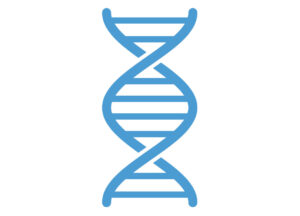- Are you interested in genomics?
- Are you an undergraduate rising sophomore, undergraduate rising junior, or a community college student?
- Do you belong to a group that is underrepresented in science, or do you self-identify as coming from a disadvantaged background?

About EDGE Genomics
UNC Educational Pathways to Increase Diversity in GEnomics (EDGE Genomics) is an innovative 2-year summer program that provides training in research skills, career education, and mentoring to a diverse group of undergraduate students, including those from underrepresented and disadvantaged backgrounds, who are interested in careers in genomics. EDGE Genomics is aimed at freshman and sophomore undergraduate students.
EDGE Genomics has a unique 2-year program structure.
Year 1 provides students with an overview of the fields of genetics and genomics: basic research, applications of genomics in patient care, ethical, legal, and social issues, and career pathways. Students receive mentoring from faculty and scientists in training.
The Year 2 research experience places students in cutting-edge research labs at UNC-Chapel Hill. Students work on an independent research project, attend weekly lab meetings and journal clubs, and present their research at the end of the program. EDGE Genomics students, faculty, and staff have build a vibrant community of peers and mentors that will guide students as they embark on their careers.
Timeline for 2024 program:
- mid December 2023: application period opens
- January 22, 2024: virtual open house event (12:00-12:45pm and 4:00-4:45pm, identical sessions, find Zoom link below)
- February 19, 2024: applications due
- late March or early April 2024: acceptances announced
- July 8-26, 2024: program dates for year 1 students
- June 3 – July 26, 2024: program dates for year 2 students
EDGE Genomics students receive compensation ($1800 for year 1 students and $4800 for year 2 students). Housing and meals are provided when students are in-person at UNC. Training typically runs from 9am-5pm weekdays, with optional weekend social events. There is no tuition charged or course credit offered for EDGE Genomics.
EDGE Genomics is an innovative 2-year summer program for undergraduate students who are interested in careers in genomics. EDGE Genomics especially welcomes applications from students who are underrepresented in the field of genomics: individuals who belong to underrepresented racial and ethnic groups (Native Americans/Alaska natives, Hispanic Americans, Hawaiian natives/U.S. Pacific Islanders, and African Americans), individuals with disabilities, and/or individuals from socioeconomically disadvantaged backgrounds. Students must be U.S. citizens or permanent residents. Students must be 18 years old or older at the start of the program. EDGE Genomics is aimed at freshman and sophomore undergraduate students.
Application Process
EDGE Genomics applications will be accepted only through this online process.
The application must be completed in one sitting, and the following documents must be ready for upload during the application process:
- Written answers to these questions: (maximum 600 words for your answers to all 4 questions combined)
- 1. What excites you the most about science/STEM and motivates you to learn more?
- 2. What are your current educational and longer term career goals?
- 3. Are there any challenges, barriers, or extenuating circumstances that are impeding your progress towards your goals?
- 4. How will participating in EDGE Genomics help you achieve your goals?
- Unofficial transcript (pdf format). This document should list all of the college courses you have taken and the grades received.
- Copy of your resumé.
- Name(s) and email address(es) of the individual(s) who will fill out a recommendation form for you.
Your completed application must be received by 11:59 pm on February 19, 2024. Incomplete or late applications will not be accepted.
Recommendations
The EDGE Genomics application requires at least one recommendation form to be filled out by one of your AP or college-level science/STEM course instructors. You may have one additional optional recommendation from a non-relative who knows you well. Download the recommendation form here or from the applynow.unc.edu site linked above and email it to your recommender(s). The recommender(s) will fill out the form(s) and email them to precisionmedicine@med.unc.edu by 11:59pm on February 26, 2024. Applications without recommendation forms will not be reviewed.
If you have any questions, email precisionmedicine@med.unc.edu.
Overview: EDGE Genomics coursework and training focuses on three areas of emphasis:

Genomics in the lab

Genomics research in medicine

Genomics in society
These three areas of emphasis are threaded through the program elements:
 |
Mentoring Circles: Mentors provide guidance and advice to students. EDGE Genomics students will be matched with peer and career mentors. Mentoring circles consisting of EDGE Genomics students, graduate student mentors, and faculty mentors will meet weekly. |
 |
Mentored Research Experience: Year 2 EDGE Genomics students will work on an independent research project in the lab of their research mentor. They will attend weekly lab meetings and present their results at an end-of-program mini-symposium. |
 |
Science Communication Training: Communicating science ideas and findings to others (both scientists and lay audiences) is critical to a successful career in science. EDGE Genomics students will receive training in written, visual, and oral communication. Year 2 will culminate in a research presentation based on the mentored research experience. |
 |
Professional development: The UNC Summer Undergraduate Pipeline (SUP) is organized by the UNC Graduate School’s Diversity and Student Success program. SUP assists students with the transition into graduate school by providing professional development seminars on topics such as succeeding in graduate school, networking, and writing personal statements. |
 |
Careers in Genomics: Students will learn about training paths and job descriptions for various careers in academia, medicine, industry, government, and nonprofits. Students will meet with genetic counselors, clinical geneticists, research scientists, bioethicists, lawyers who specialize in genomic issues, bioinformaticists, genomic analysts, and other professionals working in careers that span the fields of genetics and genomics. |
We have many research mentors who are interested in hosting EDGE Genomics students in their labs. In spring 2023, we matched student interests with faculty who had space in their lab for summer 2023. Examples of research projects are listed below.
List of EDGE Genomics research mentors
- Example 1: Research to understand the contribution of epigenetics to inheritance using the nematode Caenorhabditis elegans.
- Participating scientist: Dr. Shawn Ahmed, Professor, Genetics and Biology
- Example 2: Research to identify genes and understand the genetic and biological mechanisms that increase risk for substance abuse disorders using animal models
- Participating scientist: Dr. Lisa Tarantino, Professor, Genetics
- Example 3: Epigenetic regulation of T-cell specification and function in development and disease
- Participating scientist: Dr. Ageliki Tsagaratou, Assistant Professor, Genetics
- Example 4: Application of high-throughput sequencing to understand how chromatin changes contribute to liver disease and liver cancer
- Participating scientist: Dr. Jesse Raab, Assistant Professor, Genetics
- Example 5: Research to study the function of chromatin enzymes in neural crest stem cell enhancer regulation
- Participating scientist: Dr. Karl Shpargel, Associate Professor, Genetics
Training Opportunities
UNC Center for Faculty Excellence TEAM ADVANCE training. Organized by the UNC Center for Faculty Excellence, TEAM (Targeting Equity in Access to Mentoring) ADVANCE promotes accessible, equitable, and effective mentoring across the University, with an emphasis on supporting women of color and white women in STEM fields.
Center for the Improvement of Mentored Experiences in Research (CIMER). The mission of CIMER is to improve the research mentoring relationships for mentees and mentors at all career stages through the development, implementation, and study of evidence-based and culturally-responsive interventions. CIMER offers Entering Mentoring training for research mentors and Entering Research training for students.
Resources for Interactive Teaching
Science of Effective Mentorship in STEMM – online guide from the National Academies
Google Jamboard – digital interactive whiteboard
Poll Everywhere – UNC affiliated polling platform
Open Stax Biology – open access textbook, could be useful for before-class background reading
Case Studies – from the National Science Teaching Association
BioInteractive resources – from the Howard Hughes Medical Institute
CourseSource – an open-access journal of peer-reviewed teaching resources for undergraduate biology and physics
- Clinical Genomics Careers Panel Series: a multi-part, virtual panel series where undergraduate students, interns, and other interested learners can hear more about various careers in genomics. Panels focused on genetic counselors, clinical laboratory careers, physician (MD) clinicians, research & development, and stepping stone (transitional) opportunities. Hosted by the Clinical Genome Resource.
- Careers in Human Genetics flowchart and list of careers organized by education path: undergraduate degree, master’s degree, law degree (JD), medical degree (MD/DO), doctoral degree (PhD), or physician scientist (combined MD-PhD). Hosted by the American Society of Human Genetics.
- Career Explorations in Genomic Medicine Research podcasts. These podcasts are hour-long conversations with professionals working in genomics-related fields: clinical care, basic science research, informatics, and ethical, legal, and social issues.
- EDGE Genomics LinkedIn page
- Connected Papers – tool that generates concept maps linking published research articles
- Comparing CVs and resumes
- NIH’s Guide to CVs and resumes
- Letters of Recommendation for Graduate School
- Personal Finance for PhDs
- Individual Development Plans (IDPs) – a tool to help with goal setting
Some institutions offer an undergraduate major in genetics or genome studies, but these are not as common as majors in biology. Many undergraduate minors are relevant to a career in genetics and genomics. The following list includes many relevant minors. Those with web links are minors offered at UNC Chapel Hill. Most of the fields listed here have options for graduate study.
- Biology or Molecular Biology
- Biochemistry or Chemistry
- Biotechnology
- Epidemiology
- Statistics & Analytics, Biostatistics, or Mathematics
- Computer Science, Data Science, Bioinformatics, or Information Systems
- Language (such as Spanish)
- Ethics
- Communication studies
- Psychology
- Health & Society
- Sociology
- Medical Anthropology
- Medicine, Literature, and Culture
- Social and Economic Justice
- Public Policy
In addition, the Department of Allied Health Sciences at UNC Chapel Hill offers 3 degrees in Clinical Laboratory Science (CLS): a bachelor of science degree and 2 master’s degrees. After completion of their degree, CLS students are prepared to perform and interpret the wide variety of tests used in health care and other settings, ensuring the validity of results, and explaining the results to other health care professionals.
There are many other summer undergraduate research programs focusing on genomics. EDGE Genomics students should be competitive applicants for any of these programs.